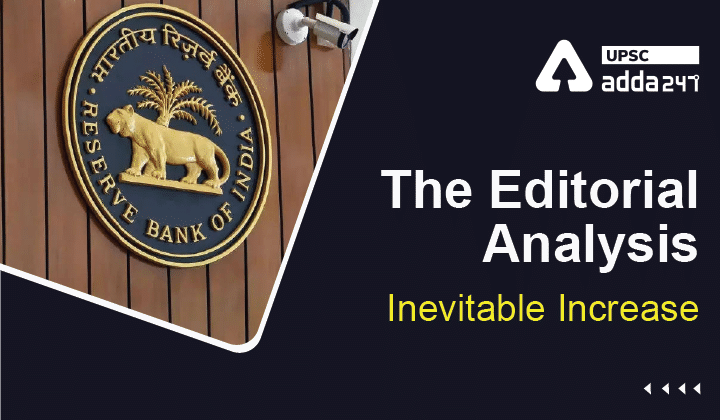Table of Contents
Inflation in India: Relevance
- GS 3: Indian Economy and issues relating to planning, mobilization, of resources, growth, development and employment.
Monetary policy committee: Context
- In the recently held MPC (Monetary Policy Committee) meeting, it was decided to increase the repo rate to 4.40%, an increase of 40 bps, to tame inflation in India.
Inflation news: Key points
- The RBI’s rate setting panel has announced an ‘off-cycle’ increase in benchmark interest rates to 4.4% with immediate effect.
- The decision to raise borrowing costs comes after the gap of 45 months.
Increase in repo rate: Why needed?
- Prices are on a tear globally and inflationary pressures are broadening worldwide.
- The IMF last month said that the war in Ukraine was poised to not only slow global growth in 2022 but would also cause inflation to accelerate in both developed and developing economies.
- The prospects of volatility in capital flows, adding pressure on the exchange rate and consequently heightening the risks of imported inflation have forced RBI to take such stance.
- The fact that the novel coronavirus is still lurking and it could trigger a fresh wave of infections, as seen in China, adds considerably to the uncertainty.
- Monetary authorities have also rightly pointed to the impact that the increases in domestic pump prices of petroleum products have had on inflation.
Impact of high inflation
- Inflation has steadily eroded consumers’ purchasing power: High inflation has adverse effects on the poorer segments by eroding their purchasing power.
- Derailed broader economic momentum: Sustained high inflation hurts savings, investment, competitiveness and output growth.
- Hurt growth and stability: High inflation for too long risked ‘de-anchoring inflation expectations’ and consequently hurting growth and financial stability.
Controlling inflation: Way forward
- Both the RBI and fiscal authorities need to take every possible measure including cutting fuel taxes to keep inflation from running away and landing the economy in stagflation.
Additional information
Inflation definition
- Inflation is an economic term describing the sustained increase in prices of goods and services within a period.
Inflation effects
- People start consuming or buying less goods and services as their income is limited. It leads to slowdown not only in consumption but also production. Production is affected because manufactures would produce fewer goods due to high costs and anticipated lower demand.
- Increased bank interest: Banks will increase interest rates as inflation increases otherwise real interest rate will be negative. (Real interest = Nominal interest rate – inflation). This, in turn, would make borrowing costly for both consumers and corporate
- Higher interest rates also lead to slowdown in the economy, which in turn could lead to increase in unemployment as companies start focusing on cost cutting and reduces hiring. E.g., Jet Airways lay off over 1000 employees to save cost.
- Rising inflation can prompt trade unions to demand higher wages, to keep up with consumer prices. Rising wages in turn can help fuel inflation. So, the vicious cycle will continue.
Read current affairs for UPSC





 TSPSC Group 1 Question Paper 2024, Downl...
TSPSC Group 1 Question Paper 2024, Downl...
 TSPSC Group 1 Answer key 2024 Out, Downl...
TSPSC Group 1 Answer key 2024 Out, Downl...
 UPSC Prelims 2024 Question Paper, Downlo...
UPSC Prelims 2024 Question Paper, Downlo...
